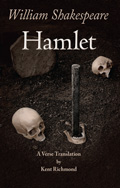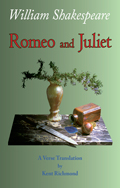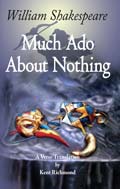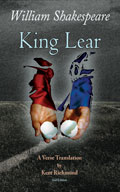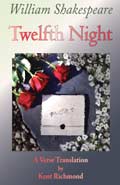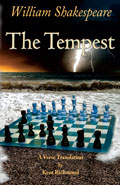What is Iambic Pentameter?
How Iambic Pentameter Works, cont.
Unmetrical Lines
If trochaic, spondaic, and pyrrhic feet can come anywhere in a line, then wouldn’t just about any ten-syllable line be iambic pentameter? Actually, the meter is more restricted than it appears because of one rule: a word with a trochaic rhythm cannot fill the 2nd, 3rd, 4th, or 5th foot unless a stressed syllable or a major punctuation break precedes that foot. Sounds complicated, but that is the rule violated by the positioning of dinner in (22).5
(22) Áfter/ dínner/ he wálked/ acróss/ the stréet/
The -ter of after and the first syllable of the trochaic word dínner cannot be in two separate feet because that leaves the stressed syllable of dinner in an odd-numbered position surrounded by two unstressed syllables. Forcing the two-syllable word dinner into an iambic rhythm is too unnatural, something on the order of d’nér. To fix this line, we need to nudge the first syllable of dinner into an even-numbered position. Here are several possibilities.
(23)
He áft/er dín/ner wálked/ acróss/ the róad/
He wálked/ ‘cross th’ róad/ right áf/ter dín/ner, sír
The second line requires two contractions—’cross and th’ road. We modern readers are probably comfortable with ’cross, but th’ road may not roll off our tongues too easily. It looks a bit desperate and is certainly not the finest example of blank verse, but Shakespeare himself often took such short cuts. Can you figure out these? Woo’t, ‘a, s’, to’t, tak’n, sev’n, within’s. (Answers: wouldst thou, he, his, to it, taken, seven, within this).
Regardless of what precedes it, we rarely find a word with a trochaic rhythm filling the last foot. Line (24), like (22), is unmetrical and interpreted as prose, not verse.
(24) He wálked/ acróss/ the róad/ to éat /dínner/
Line (24) can be corrected if we force a feminine ending by adding an extra syllable, in this case the word his.
(25) He wálked/ acróss/ the róad/to éat/his dínner/6
Verse vs. Prose
To highlight the difference between verse and prose, let’s mechanically divide a prose passage from King Lear into ten-syllable lines. Even with slurring and long lines, only the lines in bold italics could pass as iambic pentameter, and some of these require uncharacteristic and rather clumsy breaks in the syntax at the end of lines. The other lines all deviate from Shakespeare’s usual verse.
(26) EDMUND
This is the exc’llent fopp’ry of the world
That, when we are sick in fortune—often
The surfeit of our own behaviour—we
Make guilty of our disasters the sun,
The moon, and the stars; as if we were villains
On necessity; fools by heavenly
Compulsion; knaves, thieves, and treachers by spherical
Pre-dominance; drunkards, liars, and adulterers
By an enforcèd obedience of
Planetary influence; and all that
We are evil in, by a divine thrusting
On: an admirable evasion of whoremaster
Man, to lay his goatish disposition
To the charge of a star! My father compounded
With mý mother under the dragon’s tail
And my nativity was under Ursa
Major; so that it follows I am rough
And lecherous.—Tut! I should have been that
I am, had the maidenliest star in
The firmament twinkled on my bastardizing. (King Lear, 1.2.125-140)
All told, only five out of twenty lines can be read as verse, and that is why Edmund’s speech is always formatted as prose.
Let’s compare Edmund’s prose soliloquy to a passage that certainly complicates the iambic pattern yet is always formatted as verse. The more difficult lines to scan are highlighted with bold italics .
(27) LEAR
Peace, Kent! [short line]
Come not between the dragon and his wrath.
I loved her most, and thought to set my rest
On her kind nursery—Hence, and avoid my sight!
So be my grave my peace, as here I give
Her father’s heart from her!—Call France—who stirs?
Call Burgundy!—Cornwall and Albany,
With my two daughters’ dowers digest this third: [slur dowers to one syllable]
Let pride, which she calls plainness, marry her.
I do invest you jointly in my power,
Pre-eminence, and all the large effects
That troop with majesty.—Ourself, by monthly course, [long]
With reservation of an hundred knights,
By you to be sustained, shall our abode
Make with you by due turns. Only we still retain [long]
The name, and all th’ additions to a king;
The sway, revénue, execution of the rest, [long]
Belovèd sons, be yours; which to confirm,
This coronet part betwixt you....[slur coronet] (King Lear, 1.1.135-155)
This passage is about as wild as Shakespeare’s iambic pentameter gets, yet only five of the eighteen full lines are difficult to scan. Three are long lines (hexameters), more frequent in Shakespeare’s later plays, and the other two deviant lines have rather complicated rhythms, perhaps to signal that Lear is yelling and losing his temper.
This comparison shows that iambic pentameter is not prose and that verse dramatists are quite aware when they are shifting between verse and prose (even if many modern actors obscure the difference). It also shows that iambic pentameter, while it allows for deviation in line length and rhythm, imposes constraints on a line.
Reading Tips
Verse and Prose
To become more aware of when Shakespeare is using verse or prose, pay attention to how editors format the lines. In verse passages, all lines begin with a capital letter and long lines have a hanging indent.
(28)
Horatio
What art thou that usurp'st this time of
night,
Together with that fair and warlike form
In which the majesty of buried Denmark
Did sometimes march? By heav'n, I charge
thee speak.
Marcellus
It is offended.
Barnardo
See it stalks away. (Hamlet, 1.1.54-58)
Marcellus and Bernardo are sharing a line of verse, so Bernardo's line is tabbed over to show that he is finishing the verse line started by Marcellus. Prose passages, on the other hand, do not have hanging indents and use normal capitalization rules:
Hamlet
Speak the speech, I pray you, as I pronounced it to you trippingly on the tongue; but if you mouth it, as many of our players do, I had as lief the town-crier spoke my lines. Nor do not saw the air too much with your hand, thus, but use all gently; for in the very torrent, tempest, and, as I may say, whirlwind of your passion, you must acquire and beget a temperance that may give it smoothness.... (Hamlet, 3.2.1-8)
Listening for Phrasal Stress
Shakespeare took the trouble to write most of his dialog in verse, and most of his verse lines hold to the meter. So to get a feel for Shakespeare's language, it helps to do some scanning as you read. But be warned, scanning is more than a simple mechanical process.
Line (30) is an easy line to scan because Shakespeare placed content-heavy words—jest, scars, never, felt, wound— in the stressed positions.
(30) He jésts/ at scárs/ that név/er félt/ a wóund./ (Romeo and Juliet, 2.2.1)
The less important words that provide the glue that holds the sentence together—he, at , that, a—and the second syllable of never comfortably fall into the unstressed positions. Does a strategy of placing stress on content-heavy words always work?
English has a feature of pronunciation called phrasal stress (or rhetorical stress when applied to meter) that complicates scanning. Phrasal stress allows the speaker to give extra stress to the most important word in a phrase or sentence. This extra emphasis by default will appear near the end of a phrase, especially if the words are rather equal in importance. If you say the line in (31) with normal emphasis (assuming you do not speak in a monotone), you will hear the pitch of your voice rise and fall as you say the word wound.
(31) He jésts at scárs that néver félt a wóund.
Phrasal stress explains why longer words, when spoken in isolation, seem to have one syllable with extra emphasis (see Exercise 1b).
(32)
éstimátion
óverlóok
In actual sentences, though, this phantom stress may disappear.
(33)
To be of worth and worthy éstimátion (Two Gentleman of Verona, 2.4 )
Of éstimátion and command in árms. (Henry IV,part I, 4.4)
In the first line, we sense that the second stress in estimation is stronger because the word is likely to receive phrasal stress. In the second line, the two stressed syllables in estimation seem about the same if the phrasal stress falls on arms.
Phrasal stress does not have to land at the end of a sentence. Speakers can place it on whatever word they feel is most important. That means phrasal stress does not always fall on a content word. You can see this possibility in the way we respond to statements and questions.
(34)
Did you spill it? No, hé spilled it.
I hear you’re now a manager. No, I’m thé manager.
You’re not serious. I ám serious.
New or unpredictable information can attract the phrasal stress, and occasionally that information is not a content word. So if you scan by simply adding emphasis to any content-heavy word, you may be missing the emphasis that Shakespeare intended.
Sometimes Shakespeare appears to take advantage of the iambic rhythm itself to draw attention to a word we might not normally stress. Take a look at the boldfaced feet in this passage from Act 3 of Hamlet. Normally the content words tempt, call, and make would get more stress, but here the meter suggests Shakespeare wants the actor playing Hamlet to emphasize you. He does this by placing the word you in a position where the meter pulls us to add extra emphasis.
(35)
Not this by no means that I bid you do:
Let the/ bloat king/ tempt yóu/ again/ to bed,/
Pinch wan/ton on/ your cheek,/ call yóu/ his mouse,/
And let him, for a pair of reechy kisses
Or paddling in your neck with his damned fingers,
Make yóu/ to rav/el all/ this mat/ter out/ (Hamlet, 3.4.203-208)
This analysis is speculative, of course but seems a likely example of Shakespeare's artful use of iambic pentameter.
The speaker’s attitude and emotional state can also influence phrasal stress. Actors, of course, will be on the lookout for such clues and play with phrasal stress to supply this kind of information about the character they are playing. Take a look at a line we studied before. On paper it has six likely phrasal stresses.
(36) Nó, nó,/ nó, nó./ Cóme, lét’s/ awáy/ to prís/on (King Lear, 5.3.9)
An actor playing an angry Lear might prefer pounding out these phrasal stresses with a series of spondees. But what if he sees Lear as resigned to his fate and calmly dismissing the preceding question? He then may choose to skip along more quickly and land phrasal stress on the 2nd and 4th noes.
(37) Nó, nó,/ nó, nó./ Cóme, Lét’s/ awáy/ to príson/ (King Lear, 5.3.9)
As readers or actors, where we place rhetorical stress can affect both the rhythm and meaning of a line. That is why scanning a line of verse is challenging and involves more than a mechanical process.
Keep in mind, though, that phrasal stress and metrical stress usually coincide—good writing generally requires it—and that mechanical approaches for scanning lines are helpful. Shakespeare no doubt counted syllables and tapped out meter in his head. Just remember there are two language phenomena at work. Metrical stress establishes an underlying rhythm by taking advantage of the way we normally pronounce words. Phrasal (or rhetorical) stress concerns a decision as to what word is most important in a phrase. Consider both when scanning a line.
© 2014 by Kent Richmond
Notes
5 I gleaned this rule from a 1975 paper by linguist Paul Kiparsky. He was improving upon the work in generative metrics by Morris Halle, Samuel Jay Keyser, Joseph Beaver, and others. Although I avoid the technical jargon of Halle and Keyser’s approach and use the terminology of traditional metrics, I am much influenced by their work. If you are interested in this very technical approach, see the Wikipedia article on iambic pentameter or the article on generative metrics. Kiparsky’s article is available on JSTOR. And here's a website on iambic pentameter that acknowledges Halle and Keyser’s contribution and explains their concept of the stress maxima. Halle and Keyser developed a clever tool for tabulating the complexity of a metrical line. (back to article)
6 Some, particularly George T. Wright in his Shakespeare's Metrical Art, seem to resist and dismiss precise rules for spotting unmetrical lines. Wright seems to be arguing that a line such as (38)
(38) Hé and/ Lépid/us are/ at Caes/ar's house (Julius Caesar, 3.2.264)
with its double trochee in the first two feet is not unmetrical but just very rare. But such rhythms are only rare when one is writing iambic pentamenter, so it seems safe to say that Shakespeare either wrote an unmetrical line or was writing prose.
Wright even lists the opening line of the Keats sonnet in (39) as metrical. But I understand the line to be a metrical joke, where Keats purposely disrupts the rhythm in the 3rd and 4th foot to pun on "lapses of time."
(39)
How man/y bards/ gíld the/ lápses/ of time!
A few of them have ever been the food
Of my delighted fancy,—I could brood
Over their beauties, earthly, or sublime:
And often, when I sit me down to rhyme,
These will in throngs before my mind intrude:
But no confusion, no disturbance rude
Do they occasion; 'tis a pleasing chime.
So the unnumbered sounds that evening store;
The songs of birds—the whispering of the leaves—
The voice of waters—the great bell that heaves
With solemn sound,—and thousand others more,
That distance of recognizance bereaves,
Makes pleasing music, and not wild uproar.
Wright seems a bit stubborn here. A lapse in time is a lapse in time.
Keep in mind that poets are not obligated to mimic the way Shakespeare employed iambic pentameter. Poets do not have to advertise what meter they are using and may loosen or tighten the reins a bit or mix types. In "Elegy Written in a Country Churchyard" (40), Thomas Gray (1716-1771) seems to prefer a straightforward, undisguised iambic pentameter, similar to the verse in Shakespeare's early plays, with most lines ending where we would naturally pause (end-stopped to use the jargon of metrical analysis):
(40)
The curfew tolls the knell of parting day,
The lowing herd wind slowly o'er the lea,
The plowman homeward plods his weary way
And leaves the world to darkness and to me....
Others may merely flirt with iambic pentameter or make it quite complex. "Holy Sonnet 14" (41) by John Donne (1572-1631) certainly pushes the limits. Besides the rough and tumble meter, he breaks the 1st and 3rd lines mid-phrase. This device, called enjambment, has the effect of disguising the iambic pentameter a bit. Shakespeare used enjambment more and more frequently as his career proceeded.
(41)
Batter my heart, three-personed God; for You
As yet but knock, breathe, shine, and seek to mend;
That I may rise, and stand, o'erthrow me, and bend
Your force, to break, blow, burn, and make me new.
I, like an usurped town, to another due,
Labor to admit You, but oh! to no end.
Reason, Your viceroy in me, me should defend,
But is captived, and proves weak or untrue.
Yet dearly I love You, and would be loved fain,
But am betrothed unto Your enemy;
Divorce me, untie, or break that knot again,
Take me to You, imprison me, for I,
Except You enthrall me, never shall be free,
Nor ever chaste, except You ravish me. (back to article)
Exercises
Complete these exercises as you read the article.
Exercise 8
In this exercise you will practice scanning. That means reading the lines in a way that makes them sound like iambic pentameter. Ideally, the lines will still sound natural. Here is an example from Hamlet:
Example:
To bé/ or nót/ to bé/—that is/ the qués/tion:
Whéther/ 'tis nó/bler in/ the mínd/ to súf/fer
The slíngs/ and ár/rows of/ outrá/geous fór/
tune,
Or to/ táke árms/ agáinst/ a séa/ of tróu/bles
And, by/ oppós/ing, énd/ them. To díe/, to sléep/—
The slashes show the feet. The accent marks show which words are emphasized. The strike-throughs show which syllables, though spoken, are ignored in the syllable count (feminine endings, epic caesuras, or slurring).
Now you try. Here is Duke Orsino’s famous opening speech in Twelfth Night. Scholars have argued that the meter is as fickle and impulsive as the Duke himself, with smooth, flowing phrases interrupted by spondaic rhythms. Several stress marks have been added to show how Shakespeare likely pronounced the words.
(to mark on the speech, copy it into a word processor or print a pdf version)
DUKE ORSINO
If music be the food of love, play on.
Give me excéss of it, that, surfeiting,
The appetite may sicken and so die.
That strain again! It had a dying fall.
O, it came o’er my ear like the sweet sound
That breathes upon a bank of violets,
Stealing and giving odour. Enough; no more.
‘Tis not so sweet now as it was before.
O spirit of love, how quick and fresh art thou!
That, notwithstanding thy capacity
Receiveth as the sea, nought enters there,
Of what validity and pitch soé’er,
But falls into abatement and low price,
Even in a minute. So full of shapes is fancy
That it alone is high fantastical.
(Twelfth Night, 1.1.1-15)
Answer to Exercise 8
Here is one effort to scan this passage using a fairly natural pronunciation, meaning there is no conscious effort to force an iamb into every foot. Your reading may decide to emphasize words differently.
DUKE ORSINO
If mús/ic be/ the fóod/ of lóve,/ pláy ón/.
Gíve me/ excéss/ of it,/ that, súr/feiting,/
The áp/petíte/ may síck/en and/ só díe./
That stráin/ agáin!/ It hád/ a dý/ing fáll./
Ó, it/ cáme ó’er/ my éar/ like the/ swéet sóund/
That bréathes/ upón/ a bánk/ of ví/olets,/
Stéaling/ and gív/ing ó/dor. Enóugh;/ nó móre./
‘Tis nót/ só swéet/ nów as/ it was /befóre./
Ó spírit/ of lóve,/ hów quíck/ and frésh/ art thou!/
That, nót/withstánd/ing thy/ capác/ity/
Recéiv/eth as/ the séa,/ nóught én/ters there,/
Of whát/ valíd/ity/ and pítch/ soé’er,/
But fálls/ into/ abáte/ment and/ lów príce,/
Éven ín/ a mín/ute. Só fúll/ of shápes/ is fán/cy
That it/ alóne/ is hígh/ fantás/tical./
Exercise 9
To complete this exercise, click show answers to Exercise 8.
- This suggested scanning of Duke Orsino's speech allows four trochaic feet (highlighted). Do they interrupt the meter or are they permitted under the rules we studied?
- How many spondaic feet are in this scansion?
- How many pyrrhic feet can you find?
Answers to Exercise 9
- They are permitted. Give me, O it and stealing are permitted because they occur at the beginning of a line. Now as is permitted for two reasons. First, it follows a foot that ends with a heavily stressed syllable. Second, individual words are not a problem if the emphasis can be adusted to soften the trochaic feel without sounding too unnatural.
- 12 (highlighted below)
- 15 (highlighted below)
DUKE ORSINO
If mús/ic be/ the fóod/ of lóve,/ pláy ón/.
Gíve me/ excéss/ of it,/ that, súr/feiting,/
The áp/petíte/ may síck/en and/ só díe./
That stráin/ agáin!/ It hád/ a dý/ing fáll./
Ó, it/ cáme ó’er/ my éar/ like the/ swéet sóund/
That bréathes/ upón/ a bánk/ of ví/olets,/
Stéaling/ and gív/ing ó/dor. Enóugh;/ nó móre./
‘Tis nót/ só swéet/ nów as/ it was /befóre./
Ó spírit/ of lóve,/ hów quíck/ and frésh/ art thou!/
That, nót/withstánd/ing thy/ capác/ity/
Recéiv/eth as/ the séa,/ nóught én/ters thére,/
Of whát/ valíd/ity/ and pítch/ soé’er,/
But fálls/ into/ abáte/ment and/ lów príce,/
Éven ín/ a mín/ute. Só fúll/ of shápes/ is fán/cy
That it/ alóne/ is hígh/ fantás/tical./
Exercise 10
Pretend you are editing Shakespeare's plays. Would you format these lines as verse or prose?
- Is this a dagger which I see before me
- No profit grows where is no pleasure ta'en
- He hath bore me on his back a thousand times.
- 'Tis the time's plague when madmen lead the blind.
- Ingratitude, thou marble-hearted fiend
- More hideous when thou show'st thee in a child
- O, you are sick of self-love, Malvolio
- O, reform it altogether. And let
Verse Translations
